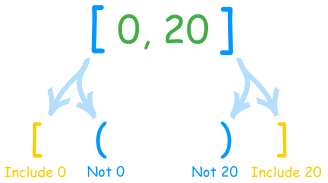Here is a link
http://www.mathsisfun.com/sets/intervals.html
Check there about the interval notation section…
Interval Notation
In “Interval Notation” we just write the beginning and ending numbers of the interval, and use:
- [ ] a square bracket when we want to include the end value, or
- ( ) a round bracket when we don’t
Like this:

Example: (5, 12]
Means from 5 to 12, do not include 5, but do include 12
#include<iostream>
#include<cstdio>
#include<cmath>
int main()
{
double i;
scanf("%lf",&i);
if(i>0 && i<25)
{
printf("Intervalo (0,25]\n");
}
else if(i>25 && i<50){
printf("Intervalo (25,50]\n");
}
else if(i>50 && i<75){
printf("Intervalo (50,75]\n");
}
else if(i>75 && i<100){
printf("Intervalo (75,100]\n");
}
else{
printf("Fora de intervalo\n");
}
return 0;
}
Wrong answer 20% code:
#include<cstdio>
#include<iostream>
#include<cmath>
using namespace std;
int main(){
double num;
cin>>num;
if((num>0) && (num<=25)){
cout<<"Intervalo [0,25]"<<endl;
}
else if((num>25) && (num<=50)){
cout<<"Intervalo (25,50]"<<endl;
}
else if((num>50) && (num<=75)){
cout<<"Intervalo (50,75]"<<endl;
}
else if((num>75) && (num<=100)){
cout<<"Intervalo (75,100]"<<endl;
}
else{
cout<<"Fora de intervalo"<<endl;
}
return 0;
}